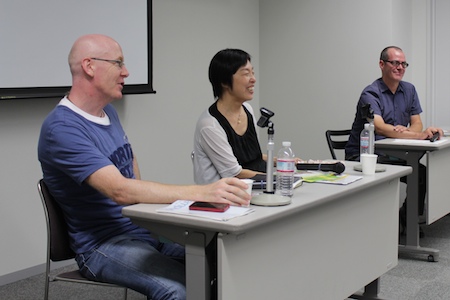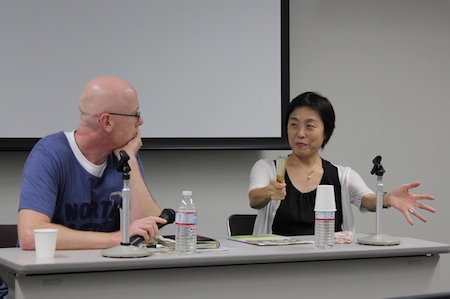[Report] Film Screening: "Ashes to Honey"
On September 12th, 2012, UTCP hosted a public screening and discussion of Kamanaka Hitomi's documentary film Ashes to Honey. Following the screening, Kamanaka-san joined for a lengthy discussion with the audience, moderated by David McNeill of Sophia University, and Mark Roberts of UTCP.

For the past ten years, Kamanaka-san has produced a series of thought-provoking documentaries about the social and economic effects of the nuclear village in Japan. Her works have explored the new generation of hibakusha across the world, the nuclear installation at Rokkasho, and the citizens struggle against the nuclear industry across rural Japan. Through these films, Kamanaka-san has been concerned with how to render visible the invisible effects of radiation on human society, and how we might re-think our present situation in the atomic age. David McNeill has authored numerous articles about nuclear and social issues in Japan, and recently published Strong in the Rain, an historical narrative of the 3/11 disaster.
Viewing Kamanaka-san's Ashes to Honey exactly one year and one day after the 3/11 disaster, the film strikes us as eerily prescient. Kamanaka-san shows the lives and conflicts of the citizens of Iwaishima, an island on the Seto Inland Sea, locked in a nearly three-decade struggle against the nuclear industry, trying to protect their lives and livelihood against the construction of a nuclear plant by Chugoku Denryoku. It is impossible not to see the protracted conflict at Iwaishima — largely ignored by the Japanese media — as a foreshadowing of the analogous struggle in Fukushima after 3/11. For, today, entire communities in Fukushima have been displaced by the massive technological and policy failures of the disaster, which have driven them into a state of accelerated social extinction. Kamanaka-san also brings these local struggles into a broader context of questions about human co-existence under the exigencies of global capitalism. To illuminate these broader issues, she travels to Sweden, camera in hand, to explore the effects of decades that were spent in pursuit of a successful alternative energy policy in Northern Europe. The film conveys a clear image of other forms of government engagement with the nuclear village. While Ashes to Honey is focused on very concrete conflicts concerning community and policy, it prompts us to reflect and re-imagine the shape of a future society and conditions of human co-existence.

During the discussion following the screening, David McNeill raised a number of issues concerning the media representation of the nuclear crisis, and the responses of the Japanese government through its four official reports, each with their own conflicting conclusions. Kamanaka-san elaborated on her experiences as a documentary filmmaker concerned with nuclear power, and offered ideas for thinking about the function of documentary film in an age saturated with mediated images.
— M. Downing Roberts, UTCP






